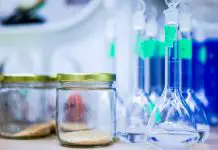About SDS solution
Sodium dodecyl sulfate (SDS) is a detergent commonly used in lysis buffers to aid in permeabilising cell membranes and in polyacrylamide gel electrophoresis (SDS-PAGE). SDS stock solutions are usually made at 10% and further diluted down to <1% in final solutions as required.
Download the recipe as a PDF
To download the SDS recipe as a PDF then click here.
10% SDS recipe
The recipe below is used to prepare a 100 mL 10% SDS stock solution.
| Reagent | Weight / Volume | Final concentration |
| SDS | 10 grams | 10% |
| Distilled H2O | Up to 100 mL |
How to make 10% SDS stock solution
- Weigh out 10 g SDS and add to a 100 mL Duran bottle. Be careful when weighing out the SDS. It is a fine powder and should be weighed under a fume hood to avoid inhalation. You can also use a fume mask as well.
- Measure out 80 mL of distilled water and add to the Duran bottle.
- Add a magnetic flea and place on a magnetic stirring plate to mix the solution. Don’t mix too fast as the solution will bubble too much. To dissolve SDS quicker, you can gently heat up the solution (60oC) using a hot plate or water bath.
- Once the power has fully dissolved, top up the solution to 100 mL using distilled water. Do not autoclave.
- An optional step is to filter the solution to remove any particles that have failed to dissolve.
Storage of 10% SDS stock solution
Store 10% SDS stock solution at room temperature (+15oC – +25oC). Do not store in the fridge, as the SDS will re-precipitate. If this has happened, warm the solution up and mix well to re-dissolve.
Safety
SDS is highly hazardous so please be careful, especially when exposed to the powder. Always read the material safety data sheet before using it.

